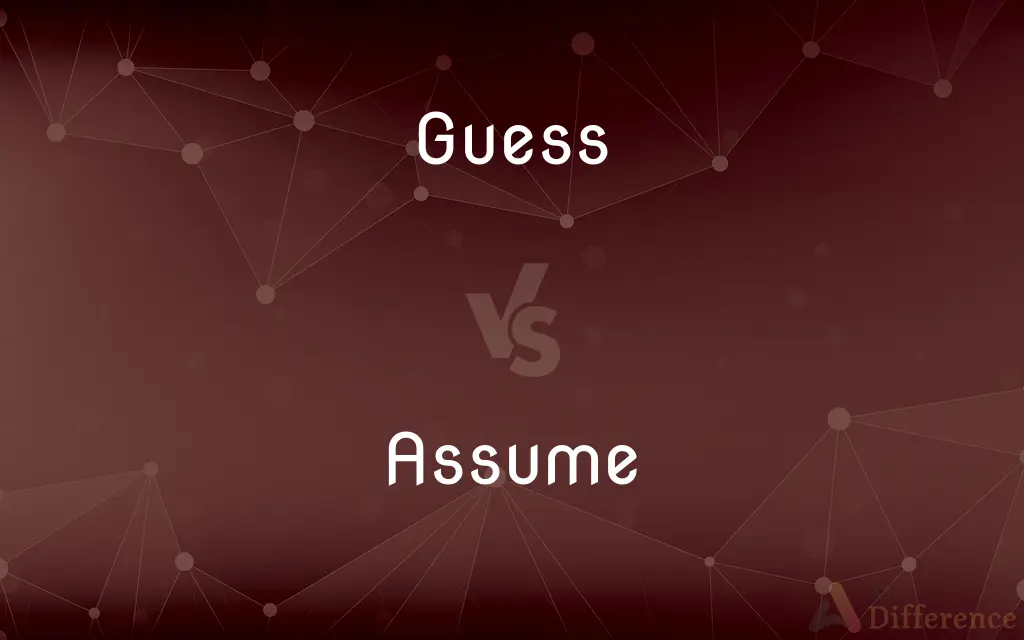Guess vs. Assume — What's the Difference?
By Tayyaba Rehman — Updated on October 12, 2023
Guess involves estimating without sufficient information; assume entails accepting something as true without verification.

Difference Between Guess and Assume
Table of Contents
ADVERTISEMENT
Key Differences
In the context of everyday language, to "guess" implies forming an answer or conclusion with the absence or scarcity of information. On the contrary, to "assume" means accepting something as true without having concrete evidence, often based on probabilities or familiar patterns. Both involve a lack of certainty but navigate through this uncertainty differently.
Exploring further, a guess typically involves selecting an answer from various possibilities without a solid foundation in facts or information. In contrast, assuming generally stems from a person's belief system, past experiences, or established patterns, and is not picked from several possibilities in the same way a guess might be.
Moreover, a guess does not always have a precedent or reason behind it, sometimes it’s purely speculative or based on instinct. An assumption, however, often draws upon some form of precedent, whether it’s a personal belief, a commonly held belief, or a pattern that seems to hold true in similar circumstances.
Furthermore, the act of guessing can sometimes be seen as a neutral act, without being tied to belief or expectation of the guesser. Assuming, on the other hand, often carries with it a belief or expectation that the assumption is, or will turn out to be, true.
In a nutshell, while both guessing and assuming lack full evidence or certainty, guessing often leans more towards speculation and possibility, whereas assuming typically involves an unverified acceptance that something is true, often due to perceived likelihood based on past experience or general beliefs.
ADVERTISEMENT
Comparison Chart
Basis
Little to no information
Some form of precedent or pattern
Connotation
Often neutral
Entails a belief or expectation
Level of Certainty
Very uncertain
Somewhat certain based on likelihood
Implication
Suggests multiple possibilities
Suggests an accepted likelihood
Dependency on Information
Generally does not rely on data
May rely on perceived patterns or beliefs
Compare with Definitions
Guess
A guess is a speculative answer.
She made a guess at the puzzle’s answer.
Assume
Assume means accepting without verification.
She will assume the role of manager.
Guess
Guess implies estimating without evidence.
He had to guess the amount needed.
Assume
Assume implies belief without proof.
I assume you will be attending the dinner.
Guess
A guess can suggest selecting from options.
She took a wild guess and chose C.
Assume
To assume can mean adopting a characteristic.
He assumed an air of indifference.
Guess
Guessing might involve intuitive choices.
He made a guess based on his gut feeling.
Assume
Assumes often rests on unconfirmed expectations.
We assume it will rain, so we’ll stay indoors.
Guess
Guesses may not be based on logic.
Her guess was as good as any.
Assume
To take for granted; suppose
The study assumes that prices will rise.
Guess
To predict (a result or an event) without sufficient information.
Assume
To take upon oneself (a duty or obligation)
Assume responsibility.
Assume another's debts.
Guess
To assume, presume, or assert (a fact) without sufficient information.
Assume
To undertake the duties of (an office)
Assumed the presidency.
Guess
To form a correct estimate or conjecture of
Guessed the answer.
Assume
To take on (an appearance, role, or form, for example); adopt
"The god assumes a human form" (John Ruskin).
Guess
To suppose; think
I guess he was wrong.
Assume
To pretend to have; feign
Assume an air of authority.
Guess
To make an estimate or conjecture
We could only guess at her motives.
Assume
To take over without justification; seize
Assume control.
Guess
To estimate or conjecture correctly.
Assume
To clothe oneself in; don
The queen assumed a velvet robe.
Guess
An act or instance of guessing.
Assume
To take up or receive into heaven.
Guess
A conjecture arrived at by guessing.
Assume
To make a supposition; suppose or believe
"Is Kay's husband coming to dinner too?" "I assume so.".
Guess
To reach a partly (or totally) unqualified conclusion.
Assume
To authenticate by means of belief; to surmise; to suppose to be true, especially without proof
We assume that, as her parents were dentists, she knows quite a bit about dentistry.
Guess
To solve by a correct conjecture; to conjecture rightly.
He who guesses the riddle shall have the ring.
Assume
To take on a position, duty or form
Mr. Jones will assume the position of a lifeguard until a proper replacement is found.
Guess
To suppose (introducing a proposition of uncertain plausibility).
That album is quite hard to find, but I guess you could try ordering it online.
Assume
To adopt a feigned quality or manner; to claim without right; to arrogate
He assumed an air of indifference
Guess
(colloquial) To think, conclude, or decide (without a connotation of uncertainty). Usually in first person: "I guess".
"I guess you were right." "What did he say?" "He guesses you were right."
"I guess I'll go to bed."
Assume
To receive, adopt (a person)
Guess
(obsolete) To hit upon or reproduce by memory.
Assume
To adopt (an idea or cause)
Guess
A prediction about the outcome of something, typically made without factual evidence or support.
If you don't know the answer, take a guess.
Assume
To take to or upon one's self; to take formally and demonstratively; sometimes, to appropriate or take unjustly.
Trembling they stand while Jove assumes the throne.
The god assumed his native form again.
Guess
To form an opinion concerning, without knowledge or means of knowledge; to judge of at random; to conjecture.
First, if thou canst, the harder reason guess.
Assume
To take for granted, or without proof; to suppose as a fact; to suppose or take arbitrarily or tentatively.
The consequences of assumed principles.
Guess
To judge or form an opinion of, from reasons that seem preponderating, but are not decisive.
We may then guess how far it was from his design.
Of ambushed men, whom, by their arms and dress,To be Taxallan enemies I guess.
Assume
To pretend to possess; to take in appearance.
Ambition assuming the mask of religion.
Assume a virtue, if you have it not.
Guess
To solve by a correct conjecture; to conjecture rightly; as, he who guesses the riddle shall have the ring; he has guessed my designs.
Assume
To receive or adopt.
The sixth was a young knight of lesser renown and lower rank, assumed into that honorable company.
Guess
To hit upon or reproduce by memory.
Tell me their words, as near as thou canst guess them.
Assume
To be arrogant or pretentious; to claim more than is due.
Guess
To think; to suppose; to believe; to imagine; - followed by an objective clause.
Not all together; better far, I guess,That we do make our entrance several ways.
But in known images of life I guessThe labor greater.
Assume
To undertake, as by a promise.
Guess
To make a guess or random judgment; to conjecture; - with at, about, etc.
This is the place, as well as I may guess.
Assume
Take to be the case or to be true; accept without verification or proof;
I assume his train was late
Guess
An opinion as to anything, formed without sufficient or decisive evidence or grounds; an attempt to hit upon the truth by a random judgment; a conjecture; a surmise.
A poet must confessHis art 's like physic - but a happy guess.
Assume
Take on titles, offices, duties, responsibilities;
When will the new President assume office?
Guess
A message expressing an opinion based on incomplete evidence
Assume
Take on a certain form, attribute, or aspect;
His voice took on a sad tone
The story took a new turn
He adopted an air of superiority
She assumed strange manners
The gods assume human or animal form in these fables
Guess
An estimate based on little or no information
Assume
Take on as one's own the expenses or debts of another person;
I'll accept the charges
She agreed to bear the responsibility
Guess
Expect, believe, or suppose;
I imagine she earned a lot of money with her new novel
I thought to find her in a bad state
He didn't think to find her in the kitchen
I guess she is angry at me for standing her up
Assume
Occupy or take on;
He assumes the lotus position
She took her seat on the stage
We took our seats in the orchestra
She took up her position behind the tree
Strike a pose
Guess
Put forward, of a guess, in spite of possible refutation;
I am guessing that the price of real estate will rise again
I cannot pretend to say that you are wrong
Assume
Seize and take control without authority and possibly with force; take as one's right or possession;
He assumed to himself the right to fill all positions in the town
He usurped my rights
She seized control of the throne after her husband died
Guess
Judge tentatively or form an estimate of (quantities or time);
I estimate this chicken to weigh three pounds
Assume
Make a pretence of;
She assumed indifference, even though she was seething with anger
He feigned sleep
Guess
Guess correctly; solve by guessing;
He guessed the right number of beans in the jar and won the prize
Assume
Christianity, obsolete; take up someone's soul into heaven;
This is the day when May was assumed into heaven
Assume
Put clothing on one's body;
What should I wear today?
He put on his best suit for the wedding
The princess donned a long blue dress
The queen assumed the stately robes
He got into his jeans
Assume
Assuming can involve unverified confidence.
They assume their plan will succeed.
Common Curiosities
What does it mean to Guess?
Guessing involves providing an answer without adequate information or evidence.
What does Assume mean?
Assuming means accepting something as true without concrete proof or verification.
Do people Guess in professional contexts?
It can happen, especially in scenarios involving predictions or when dealing with unknowns.
Can a Guess be educated?
Yes, an educated guess is made with some foundational knowledge, but still lacks certainty.
Is it okay to Guess?
In informal or low-stake situations, yes, but for important decisions, factual information is preferred.
Is assuming common in everyday life?
Yes, people often make assumptions based on their experiences, beliefs, and perceived patterns in daily interactions.
Can a Guess be correct?
Yes, a guess can be correct, but it's not based on certain information.
When is it risky to Assume?
Assuming can be risky when decisions impact people’s lives, finances, or wellbeing without verified information.
Can I assume based on past experiences?
While it’s common, it’s crucial to remember past experiences don’t guarantee future outcomes.
Why do people Guess?
People may guess due to a lack of information, for fun, or when an immediate answer is needed.
Can an Assumption be proven false?
Absolutely, assumptions can be proven false when more information becomes available.
Why do people Assume?
People assume to fill gaps in knowledge, based on patterns, or to expedite understanding and decision-making.
Can both Guessing and Assuming be avoided?
Ideally, yes, with thorough information and verification, but it may not always be practical or possible in every situation.
Can a Guess be completely random?
Yes, guesses can be entirely speculative and not based on any information.
Are assumptions always unverified?
Typically, assumptions lack full verification, even if they’re based on some form of precedent.
Share Your Discovery

Previous Comparison
Finalised vs. Finalized
Next Comparison
Monarchy vs. AristocracyAuthor Spotlight
Written by
Tayyaba RehmanTayyaba Rehman is a distinguished writer, currently serving as a primary contributor to askdifference.com. As a researcher in semantics and etymology, Tayyaba's passion for the complexity of languages and their distinctions has found a perfect home on the platform. Tayyaba delves into the intricacies of language, distinguishing between commonly confused words and phrases, thereby providing clarity for readers worldwide.
















































